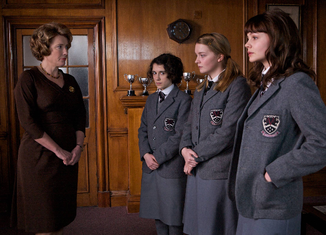
What is odd in the film is how totally OK the young Jenny Mellor's parents are with their teenage daughter being taken out and about (overnight, overnight!) by a grown man. My, perhaps prudish, little mind went into overdrive trying to work out why this was apparently acceptable in 1961. Nikki McWatters might believe that the reason is clear – Mellor was a predatory teenage girl.
In this film Mellor, and indeed in life Barber I suppose, was not predatory so much as dazzled. An Education can be summed up thus: teen girl gets bored, gets dazzled, mistakes a broken hymen for adulthood. Jenny Mellor rather thinks she might be scandalously grown-up, as she says to her former headmistress: “I suppose you think I'm a ruined woman.” “You're not a woman.”
On Friday in the HuffPost lifestyle blog McWatters was thinking about the spate of media coverage of teenage girls and older men this year. In light of the Savile stories, Megan Stammers and her 30 year old teacher and the case of Rochdale services failing a group of teenage girls, it seems fair to say we have a problem. “These men are animals. Right? Perverts with no moral sense at all. Right? Paedophiles. Right? The girls, innocent victims with no way of knowing that they were being taken advantage of. Right?”
But are we addressing the right problem wonders McWatters. Might McWatters go as far as to play devil's advocate (always a good way to acknowledge what you're about to announce is quite horrible – but you take no responsibility for it) here and, mining purely from her own experience as a teenage girl, “I know that I was fantasizing about sex from about the age of thirteen.” Fantasising and doing are very different things.
| Perhaps we aren't asking the right questions. The fact that the age of consent varies rather wildly across the globe (it doesn't take a 16 year old to tell you a 13 year old is very different) is neither here nor there. It would probably be helpful to everyone if we threw the discussion of virginity out the window. The discussion topics are surely consent, coercion and confidence. | What is not fine is to associate a change in measurements with a change in availability, maturity or knowledge. |
As McWatters notes “Some girls do develop a sexual identity before others and it doesn't always fit nicely with the current legislation that controls that area of her life.” And that's fine, nobody knows better than the flat chested teen girl, or the squeaky teen boy that we all develop at different rates. At whatever rate that is, it is the wrong rate. There is no Goldilocks rule to puberty; only too fast or too slow, never just right.
What is not fine is to associate a change in measurements with a change in availability, maturity or knowledge. Which is why I am so very uncomfortable with this assertion by McWatters: “There is a world of difference between a paedophile who grooms and targets young children for sexual abuse and a young man who is seduced by a young girl with casual sex on her mind. And it is an important distinction to make; a shade of grey that needs to be understood.”
Because the idea of who is and who isn't the 'seducer' is important. The word in this context is synonymous with who is to blame. A man, a grown man might be attracted to a teenage girl, but he is not helpless before her. A grown man (or woman – I know but McWatters is dealing only in the realm of hetero teenage girls and therefore so will I, because I too was one once) is not on the list of vulnerable human beings. A teenage girl is. Considering in the Western world grown women rarely appear to be in control, how is a teenage girl ever supposed to know if she is truly in control?
Squeamish Kate
Related Posts
Sexing the Cherry
I'm a Teen! Ask me how


 RSS Feed
RSS Feed
